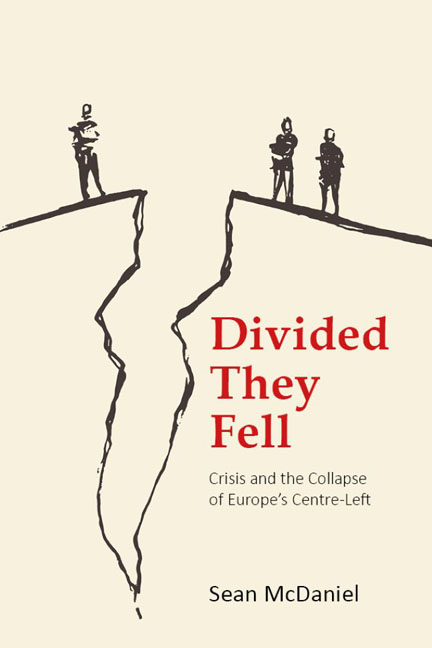Book contents
- Frontmatter
- Contents
- List of abbreviations
- Acknowledgements
- Introduction
- 1 Neoliberal convergence and the politics of austerity: is there still space for the centre-left?
- 2 Struggling to win: centre-left electoral decline and the strategic dilemma of the Third Way
- 3 Developing a strategy: the internal dynamics of the centre-left’s response to the crisis of neoliberalism
- 4 Delivering the strategy: how the centre-left sought to communicate a response to the crisis of neoliberalism
- 5 Stagnation, failure and fragmentation: the rise of the radical left
- 6 Post-pandemic politics: how are the centre-left rebuilding?
- Conclusion
- Appendix: interviewees and interview locations
- Notes
- References
- Index
2 - Struggling to win: centre-left electoral decline and the strategic dilemma of the Third Way
Published online by Cambridge University Press: 23 January 2024
- Frontmatter
- Contents
- List of abbreviations
- Acknowledgements
- Introduction
- 1 Neoliberal convergence and the politics of austerity: is there still space for the centre-left?
- 2 Struggling to win: centre-left electoral decline and the strategic dilemma of the Third Way
- 3 Developing a strategy: the internal dynamics of the centre-left’s response to the crisis of neoliberalism
- 4 Delivering the strategy: how the centre-left sought to communicate a response to the crisis of neoliberalism
- 5 Stagnation, failure and fragmentation: the rise of the radical left
- 6 Post-pandemic politics: how are the centre-left rebuilding?
- Conclusion
- Appendix: interviewees and interview locations
- Notes
- References
- Index
Summary
The electoral heyday of centre-left politics in Europe came in the three decades following the Second World War. The 1950s and 1960s witnessed the centre-left assert itself as the dominant political force on the European left, with many parties establishing themselves as genuine “parties of government”, ready to alternate in power with their right-wing rivals. Socio-economic conditions were conducive to this success. Keynesian full employment strategies, mass industry and still-dominant male breadwinner norms within the labour market had helped to create a large and homogenous unionized electoral coalition for the centre-left. The decades following have, however, been less kind. Economic globalization, deindustrialization, deunionization, labour market liberalization, technological advancement and privatization have all contributed to a more fragmented labour market. Combined with the rise of post-material values, rising female labour market entry and the advancement of higher education, society at large has changed and the political landscape along with it has fractured, giving birth to new political causes, movements and parties.
There can be little doubt that these socio-economic shifts have created an increasingly difficult terrain for the centre-left. While there is insufficient room to consider all these factors, this chapter asks: to what extent did political and electoral factors determine the centre-left's post-crisis strategy? There are two lenses through which the existing literature analyses this question. The first lens focuses on class-based voter coalitions. It points to long-term, structural reasons why the centre-left has struggled post-crisis. It contends that centre-left parties face an inherent “electoral dilemma”: as the size of the working class dwindles, a trend compounded by aforementioned secular economic and demographic change, such parties are forced into accommodating the interests of the middle class and, by extension, market-accommodating economic strategies. From this perspective, pursuing austerity post-GFC was an inevitable consequence of the way in which parliamentary politics forces left parties to moderate their economic programmes.
The second lens is that of electoral competition. It suggests that in the context of a growing debt burden post-GFC, voters called for governments to consolidate. There are two component parts to this: on the one hand, some aspects of the literature suggest voters are naturally fiscally conservative.
- Type
- Chapter
- Information
- Divided They FellCrisis and the Collapse of Europe's Centre-Left, pp. 42 - 59Publisher: Agenda PublishingPrint publication year: 2023



